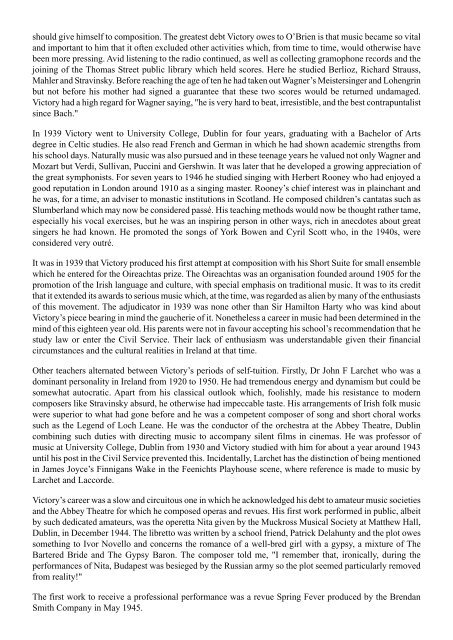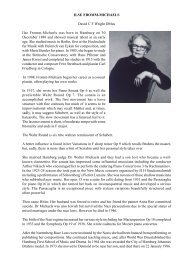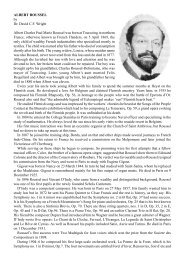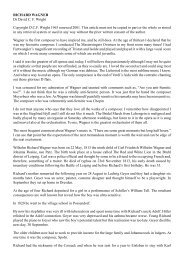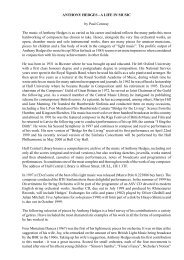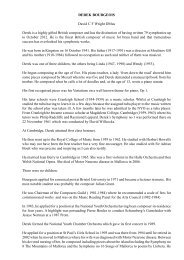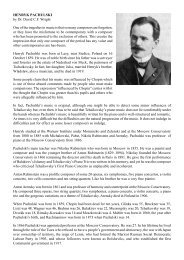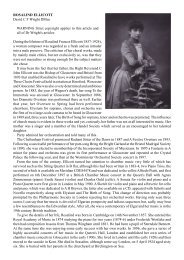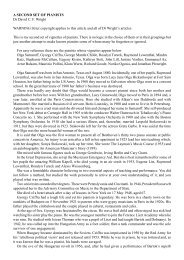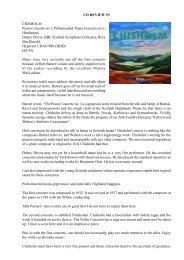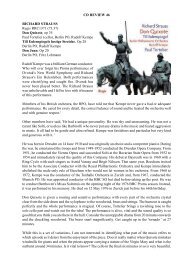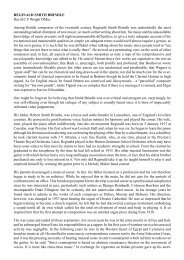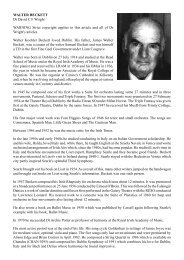You also want an ePaper? Increase the reach of your titles
YUMPU automatically turns print PDFs into web optimized ePapers that Google loves.
should give himself to composition. The greatest debt <strong>Victory</strong> owes to O’Brien is that music became so vital<br />
and important to him that it often excluded other activities which, from time to time, would otherwise have<br />
been more pressing. Avid listening to the radio continued, as well as collecting gramophone records and the<br />
joining of the Thomas Street public library which held scores. Here he studied Berlioz, Richard Strauss,<br />
Mahler and Stravinsky. Before reaching the age of ten he had taken out Wagner’s Meistersinger and Lohengrin<br />
but not before his mother had signed a guarantee that these two scores would be returned undamaged.<br />
<strong>Victory</strong> had a high regard for Wagner saying, "he is very hard to beat, irresistible, and the best contrapuntalist<br />
since Bach."<br />
In 1939 <strong>Victory</strong> went to University College, Dublin for four years, graduating with a Bachelor of Arts<br />
degree in Celtic studies. He also read French and German in which he had shown academic strengths from<br />
his school days. Naturally music was also pursued and in these teenage years he valued not only Wagner and<br />
Mozart but Verdi, Sullivan, Puccini and Gershwin. It was later that he developed a growing appreciation of<br />
the great symphonists. For seven years to 1946 he studied singing with Herbert Rooney who had enjoyed a<br />
good reputation in London around 1910 as a singing master. Rooney’s chief interest was in plainchant and<br />
he was, for a time, an adviser to monastic institutions in Scotland. He composed children’s cantatas such as<br />
Slumberland which may now be considered passé. His teaching methods would now be thought rather tame,<br />
especially his vocal exercises, but he was an inspiring person in other ways, rich in anecdotes about great<br />
singers he had known. He promoted the songs of York Bowen and Cyril Scott who, in the 1940s, were<br />
considered very outré.<br />
It was in 1939 that <strong>Victory</strong> produced his first attempt at composition with his Short Suite for small ensemble<br />
which he entered for the Oireachtas prize. The Oireachtas was an organisation founded around 1905 for the<br />
promotion of the Irish language and culture, with special emphasis on traditional music. It was to its credit<br />
that it extended its awards to serious music which, at the time, was regarded as alien by many of the enthusiasts<br />
of this movement. The adjudicator in 1939 was none other than Sir Hamilton Harty who was kind about<br />
<strong>Victory</strong>’s piece bearing in mind the gaucherie of it. Nonetheless a career in music had been determined in the<br />
mind of this eighteen year old. His parents were not in favour accepting his school’s recommendation that he<br />
study law or enter the Civil Service. Their lack of enthusiasm was understandable given their financial<br />
circumstances and the cultural realities in Ireland at that time.<br />
Other teachers alternated between <strong>Victory</strong>’s periods of self-tuition. Firstly, <strong>Dr</strong> John F Larchet who was a<br />
dominant personality in Ireland from 1920 to 1950. He had tremendous energy and dynamism but could be<br />
somewhat autocratic. Apart from his classical outlook which, foolishly, made his resistance to modern<br />
composers like Stravinsky absurd, he otherwise had impeccable taste. His arrangements of Irish folk music<br />
were superior to what had gone before and he was a competent composer of song and short choral works<br />
such as the Legend of Loch Leane. He was the conductor of the orchestra at the Abbey Theatre, Dublin<br />
combining such duties with directing music to accompany silent films in cinemas. He was professor of<br />
music at University College, Dublin from 1930 and <strong>Victory</strong> studied with him for about a year around 1943<br />
until his post in the Civil Service prevented this. Incidentally, Larchet has the distinction of being mentioned<br />
in James Joyce’s Finnigans Wake in the Feenichts Playhouse scene, where reference is made to music by<br />
Larchet and Laccorde.<br />
<strong>Victory</strong>’s career was a slow and circuitous one in which he acknowledged his debt to amateur music societies<br />
and the Abbey Theatre for which he composed operas and revues. His first work performed in public, albeit<br />
by such dedicated amateurs, was the operetta Nita given by the Muckross Musical Society at Matthew Hall,<br />
Dublin, in December 1944. The libretto was written by a school friend, Patrick Delahunty and the plot owes<br />
something to Ivor Novello and concerns the romance of a well-bred girl with a gypsy, a mixture of The<br />
Bartered Bride and The Gypsy Baron. The composer told me, "I remember that, ironically, during the<br />
performances of Nita, Budapest was besieged by the Russian army so the plot seemed particularly removed<br />
from reality!"<br />
The first work to receive a professional performance was a revue Spring Fever produced by the Brendan<br />
Smith Company in May 1945.


